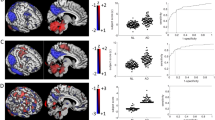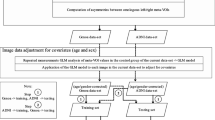Abstract
Clinical trials for interventions that seek to delay the onset of Alzheimer’s disease (AD) are hampered by inadequate methods for selecting study subjects who are at risk, and who may therefore benefit from the interventions being studied. Automated monitoring tools may facilitate clinical research and thereby reduce the impact of AD on individuals, caregivers, society at large, and government healthcare infrastructure. We studied the 18F-deoxyglucose positron emission tomography (FDG-PET) scans of research subjects from the Alzheimer’s Disease Neuroimaging Initiative (ADNI), using a Machine Learning technique. Three hundred ninety-four FDG-PET scans were obtained from the ADNI database. An automated procedure was used to extract measurements from 31 regions of each PET surface projection. These data points were used to evaluate the sensitivity and specificity of support vector machine (SVM) classifiers and to compare both Linear and Radial-Basis SVM techniques against a classic thresholding method used in earlier work.
Access this chapter
Tax calculation will be finalised at checkout
Purchases are for personal use only
Preview
Unable to display preview. Download preview PDF.
Similar content being viewed by others
References
Chang, C.-C., Lin, C.-J.: LIBSVM: a library for support vector machines. ACM Transactions on Intelligent Systems and Technology 2, 27:1–27:27 (2011), Software available at http://www.csie.ntu.edu.tw/~cjlin/libsvm
Dietterich, T.G.: Approximate Statistical Tests for Comparing Supervised Classification Learning Algorithms. Neural Computation 10, 1895–1923 (1998)
Fan, Y., Batmanghelich, N., Clark, C.M., Davatzikos, C.: Spatial Patterns of Brain Atrophy in MCI Patients, Identified via High-Dimensional Pattern Classification, Predict Subsequent Cognitive Decline. NeuroImage 39, 1731–1743 (2008)
Kohavi, R.: A Study of Cross-Validation and Bootstrap for Accuracy Estimation and Model Selection. In: 14th International Joint Conference on Artificial Intelligence, pp. 1137–1143. Morgan Kaufmann Publishers Inc., San Francisco (1995)
Illán, I.A., Górriz, J.M., Ramírez, J., Salas-Gonzalez, D., López, M.M., Segovia, F., Chaves, R., Gómez-Rio, M., Puntonet, C.G.: The Alzheimer’s Disease Neuroimaging Initiative: 18F-FDG PET imaging analysis for computer aided Alzheimer’s diagnosis. Information Sciences 181, 903–916 (2011)
Li, S., Shi, F., Pu, F., Li, X., Jiang, T., Xie, S., Wang, Y.: Hippocampal Shape Analysis of Alzheimer Disease Based on Machine Learning Methods. American Journal of Neurology 28, 1339–1345 (2007)
López, M., Ramírez, J., Górriz, J.M., Álvarez, I., Salas-Gonalez, D., Segovia, F., Chaves, R., Padilla, P., Gómez-Río, M.: Principal Component Analysis-based Techniques and Supervised Classification Schemes for the Early Detection of Alzheimer’s Disease. Journal of Neurocomputing 74, 1260–1271 (2011)
Medical Care Corporation: Screening Large Populations to Detect Early Stages of Alzheimer’s and Related Disorders: Comparison of Available Screening Tests with the MCI Screen. Technical Report (2004), http://www.mccare.com/pdf/support/product/mcis_Comparison.pdf
Minoshima, S., Frey, K.A., Koeppe, R.A., Foster, N.L., Kuhl, D.E.: A Diagnostic Approach in Alzheimer’s Disease Using Three-Dimensional Stereotactic Surface Projections of Fluorine-18-FDG PET. Journal of Nuclear Medicine 36, 1238–1248 (1995)
Sadeghi, N., Foster, N.L., Wang, A.Y., Minoshima, S., Lieberman, A.P., Tasdizen, T.: Automatic Classification of Alzheimer’s Disease vs. Frontotemporal Dementia: A Spatial Decision Tree Approach with FDG-PET. In: 5th IEEE International Symposium on Biomedical Imaging: from Nano to Macro, pp. 408–411. IEEE Press, New Jersey (2008)
Wen, L., Bewley, M., Eberl, S., Fulham, M., Feng, D.: Classification of Dementiafrom FDG-PET Parametric Images using Data Mining. In: IEEE International Symposium on Biomedical Imaging: from Nano to Macro, pp. 412–415. IEEE Press, New Jersey (2008)
Hsu, C.-W., Lin, C.-J.: A Comparison of Methods for Multi-Class Support Vector Machines. IEEE Transactions on Neural Networks 13, 415–425 (2002)
Nguyen, M.H., De la Torre, F.: Optimal Feature Selection for Support Vector Machines. Pattern Recognition 43, 584–591 (2010)
Buckner, R.L., Andrews-Hanna, J.R., Schacter, D.L.: The Brain’s Default Network: Anatomy, Function, and Relevance to Disease. Annals of the New York Academy of Sciences 1124, 1–38 (2008)
Seeley, W.W., Crawford, R.K., Zhou, J., Miller, B.L., Greicius, M.D.: Neurodegenerative diseases target large-scale human brain networks. Neuron 62, 42–52 (2009)
Author information
Authors and Affiliations
Editor information
Editors and Affiliations
Rights and permissions
Copyright information
© 2013 Springer International Publishing Switzerland
About this paper
Cite this paper
Benton, R.G., Choubey, S., Clark, D.G., Johnsten, T., Raghavan, V.V. (2013). Diagnosis and Grading of Alzheimer’s Disease via Automatic Classification of FDG-PET Scans. In: Imamura, K., Usui, S., Shirao, T., Kasamatsu, T., Schwabe, L., Zhong, N. (eds) Brain and Health Informatics. BHI 2013. Lecture Notes in Computer Science(), vol 8211. Springer, Cham. https://doi.org/10.1007/978-3-319-02753-1_27
Download citation
DOI: https://doi.org/10.1007/978-3-319-02753-1_27
Publisher Name: Springer, Cham
Print ISBN: 978-3-319-02752-4
Online ISBN: 978-3-319-02753-1
eBook Packages: Computer ScienceComputer Science (R0)




